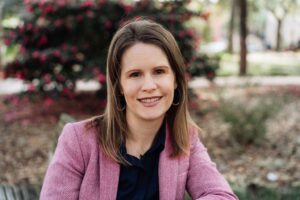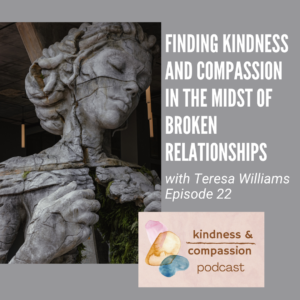
Love and compassion in divorce is an often misunderstood concept. Divorce is often seen as a negative thing, and there is a stigma attached to it that can be hard to overcome. In this episode, Gordon has a conversation with Teresa Williams, MA, MS, LPC about how love and compassion can be found even in the midst of a divorce.
When Teresa Williams, a licensed professional counselor in Huntsville, Alabama, went through her own divorce, she experienced the pain and loneliness that comes with it. She felt abandoned by family, friends, and even her church. This experience led her to start the Confident and Courageous Woman website, a coaching program designed to help women going through divorce.
Meet Teresa Williams
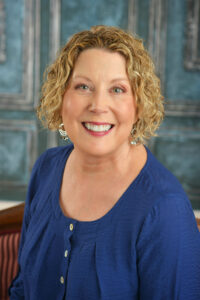
“With compassion and understanding, I serve individuals, families, and groups. Through offering practical help, I’ve watched them become hopeful as they maneuvered life in new circumstances. I am honored to sit with people in a variety of crises, life stages, relationship struggles, and painful situations. I am thankful to be a practical and hopeful voice.
My background includes a Bachelor’s degree in Human Resource Management, a Master of Arts Degree in Human Services Counseling from Liberty University, and a Master of Science in Counseling from Faulkner University. I am a Licensed Professional Counselor in Alabama. My counseling experience includes psychological assessments, working with adults, divorce recovery, women’s issues, and marital difficulties. I am a Prepare/Enrich pre-marital and marriage facilitator and a Board-Certified Life Coach. I am trained in Levels 1, 2 & 3 of Gottman Method Couples Therapy and lead seminars as a Gottman Leader of The Seven Principles for Making Marriage Work couples program. I am a speaker for business and women’s conferences/events
I love traveling with my husband, spending time reading, listening to music, and playing with our dog, Ollie.”
Help Going Through a Process
As a therapist, Teresa understands the stages of the grief process. She said expressed you think you know what to expect “until you actually walk that path, and you start experiencing the grief on multiple levels. And a lot of times people don’t know what to do.” People don’t know what to say. They take sides or they don’t take sides and they just disappear. And it’s a very chaotic time, especially in the beginning. So being able to find the support and the kindness and compassion and what that looks like can help a lot of people. People don’t know how to do that because they haven’t walked through it. Or there is judgment. There’s so much stigma. You put the word divorce between, in front of, or behind any other word, and it’s always negative. And it shouldn’t be that way. “What I have found also is being able to help others understand how to walk alongside someone who is experiencing this devastating life change.”
Loves and Acceptance Through Spiritual Beliefs
Teresa Williams wants people to know “If we look at scripture, the only people that Jesus really condemned were the Sadducees and the Pharisees. And everyone else, He had compassion for. And not that he overlooks sin, but he didn’t condemn them. He did criticize, he showed love and support. People might think “Am I committing a sin? Is God ever going to forgive me? Can I ever remarry?” Teresa continues, “I’m not a theologian, but I do know what scripture says about Jesus and how he interacted with people, and he loved them, and he accepted them where they were. And regardless of whether you view it as a sin or a survival, God still loves you, and God still accepts you. And you can move on.” Sometimes we forget that Jesus extends grace and mercy to everyone. We want that same grace and mercy from Jesus, and we need to extend that to others around us, regardless of what they’re walking through.
Grace and Self-Care Navigating through Divorce
For a lot of people, the hardest person to give grace to is herself. Especially at the beginning. There’s so much chaos. Their world has just fallen apart, and they don’t know what to do. They don’t know where to turn to. Everything around them just got shattered. There’s a lot of fear. It’s hard to not feel overwhelmed. So, taking one step at a time and self-care can be forgotten. One of the hardest things for women, just in general is asking for help. It’s hard to say, “I need help with (fill in the blank).” There’s so much judgment and criticism around divorce, especially in the church. And so, a woman is fearful to even reach out even to friends and family.
Advice for helping Someone Going Through Divorce
Loneliness is a big issue. People do not know how to come alongside. They don’t know what to say or how to help this person. That’s hard for a lot of individuals. How other people can come alongside these individuals? Spiritually, pray for them. And maybe get them involved, such as going with them to a Bible study or to a weekly meeting that the churches have. If they’ve been ostracized by their church and they feel and they don’t feel comfortable anymore going to the church, how about saying, “Hey, how about coming with me on Sunday morning?” This time is hard because this person is grieving. There are a lot of tears. Teresa remembers thinking “The tears are never going to end, and the pain is never going to stop.” A big support would be if a person can just come alongside and let that person talk without offering advice. Let them cry without judgment. Don’t take sides, just be there for that person. Just being there, just being present.
Other things that we can do alongside is for the physical side. Do something to relieve the stress on that person. Offer to take them to dinner or lunch. Come over and cook dinner for them. Take them to a concert. Go on an activity. Teresa remembers “When I went through it my house was a disaster because I was working all kinds of crazy hours at the time. And, having a house that’s messy just adds one more burden to you. And I had a good friend who just came over and allowed me to cry. And she vacuumed my floor. She washed my dishes. It was such a comfort to me. It meant so much to me.” Do something for her so she can take care of herself. Let that woman take a hot bubble bath or just sit down and catch up on laundry. Do the things that show compassion and kindness to her in her time of need.
Advice on Healing
First, take your time and take your time and allow yourself to agree with all the emotions associated with the shock of it, the anger, and the disbelief. There will be times of bargaining and all the stages of grief. Allow yourself those emotions, don’t stuff them. Get a good friend that’s going to come alongside you and be there and encourage you. This friend is one that doesn’t offer advice but just radiates encouragement and love. And then go find a therapist. Go do your own work. Find the things that you need to take care of yourself. It’s a process. It’s not a one-and-done thing. It doesn’t mean that when the ink is dry on the divorce decree that all of a sudden life’s going to go back to some type of normal and you’re going to be okay. It doesn’t work like that. Remember, it’s a process.
There will be new stages and relearning. It is learning how to deal with the triggers. The sight smells, the taste that triggers you to your past, and learning how to cope with them and not allow them to take you down and derail you. Also understanding what the new norm is. Because there is a lot of adjustments. Maybe you didn’t get the house in the divorce, or maybe you have to move. And then the custody situation if there’s kids involved. Now you’re used to having your kids all the time around you. Suddenly they have to go over to dad’s house, for the weekend or every other week. That’s a major adjustment. During this time it is so vital not to isolate yourself. It would be natural, depending on the circumstances, that you don’t want to talk to people. You don’t want to put yourself out there. You don’t want to have to explain what happened for the hundredth time. Stay active and being a part of the community and having that support is really vital to your emotional health.
Final Message from Teresa
“For the person that is walking through [divorce] I just want to encourage them. If you’re willing to do the work, if you’re willing to keep moving forward, you will be okay. I can promise you that. “…What’s really important, is to know that there’s hope in healing beyond divorce, regardless of your circumstances.”
Teresa has free resources on her web page. Go to Confident and Courageous Woman for five tips for dealing with the Stress of Divorce. They can reach out Teresa through that website. She has coaching programs and she is getting ready to launch (soon) a membership program. in membership.
Gordon Brewer: Record. Okay, Go ahead. Hello
Teresa Williams: everyone. Welcome to this episode of Kindness and Compassion Podcast. I am so excited to be here with my friend Gordon. I'm Therea Williams, licensed professional counselor in Huntsville,
Gordon Brewer: Alabama. Perfect.
Hello everyone and welcome again to the Kindness and Compassion Podcast and I'm really looking forward to you to getting getting to hear from my guest today there, Williams. Welcome there. Thank you, Gordon. Glad to be here. Yes. And there I met and I actually met through my other podcast, the Practice of Therapy podcast, and I knew from our conversation that we really wanted to I wanted to get her on this podcast because I think she is Doing some work just with this whole intersection between spirituality and what it's like for people that are going through divorce, particularly women and that sort of thing.
So therea be tell folks about yourself and how you've landed where you've landed.
Teresa Williams: Okay like I said before, I'm a licensed professional counselor and in my practice I see individual, I do married to family and I saw a need to be able to help women who, one, either walking through divorce or been divorced and maybe don't know what to do and stuck.
And I know those feelings personally because I have walked that journey. I was married for a hundred years. Not really, but it felt like it uhhuh and had children and had a spouse who committed adultery and it was a very public and nasty divorce. And I felt alone and abandoned, not by only family and friends, but also my church.
And so my hardest desire, Is to be able to help other women that, again, who are either currently walking through a divorce or been divorced for a while and don't have the support and the encouragement they need. . So I felt like the Lord was calling me. So I started a website separate from my.
Therapy practice called the competent and courageous woman. . And it is a coaching program just for that to be able to come along and work alongside other women experiencing divorce.
Gordon Brewer: Yeah. And I think it's a struggle. I know both of us are from the south, We talked about that before and I think just culturally, there's I think some misplaced stigmas around divorce and around people that are going through kind, the end of a marriage and there's a whole grieving process that occurs with that.
I know we talked about that previously, but I. In your work? What, I guess what I'm interested in, or I think maybe folks would be interested in, is it sounds like you went through a process of changing your mind about some things, just not only on the spiritual side of things, but just for you personally, and of course being a therapist to, you've got all the information, but when you experience it personally, it's a different thing.
So you wanna say something about all those things? Yeah,
Teresa Williams: it is. And like you say, being a therapist, I know all the grief stages and I know where you think you know what to expect until you actually walk that path and you start experience the grief on multiple levels. And a lot of times people don't know what to do.
They don't know what to say and they take. Or they don't take sides and they just disappear. And it's a very chaotic time, especially in the beginning. So being able to find the support and the kindness and compassion and what that looks like, a lot of people. Don't know how to do that because a either one, they haven't walked through it.
Or two from a judgmental sign like we talked about. There's so much stigma. You put the word divorce between, in front of or behind any other word, and it's always negative. And it shouldn't be that way. , what I have found also is being able to help others understand how to walk alongside someone who is experiencing this devastating life change.
.
Gordon Brewer: . Yes. Yeah. And I know one of the things I know just in my own work I'm also a marriage family therapist, and I think one of the struggles that people have as well is. Is just feeling like they are, for lack of a better term committing a sin by going through with a divorce and that sort of thing.
And so in your work with people around that, how do you help them navigate that and just really because that gets into our values and our beliefs and our faith and all of that sort of thing. How do you help people kinda walk through. Dilemma, so to speak.
Teresa Williams: If we look at scripture, the only people that Jesus really condemned were the Sadducees and the Pharisees.
And everyone else. He had compassion for right. And not that he overlooks sin. , but he didn't condemn them. , he did criticize, he showed love and support. And, they're so mis what I wanna say, interpretations of scripture. And regardless of what side of the fence you're on, whether you are the one that's wanting the divorce and.
the marriage is no longer working for whatever reason. Abuse. , whatever. And you feel like that you need to get out or your spouse is divorcing you and you're looking, you're going. Wait a minute. Am I committing a sin? Is God ever gonna forgive me? Can I ever remarried? And depending upon what orientation spiritually you stand on, one of the things that I don't try to get into mud.
I'm not a colo, but I do know what scripture says about Jesus and how he interacted with people and he loved them, and he accepted them where they were. . And regardless whether you view it as a sin or a survival, God still loves you, God still accepts you. And you can move on.
Gordon Brewer: And I think the other thing that's helpful to maybe understand is that the when the scriptures were written, and again, I'm not. I don't want to, I don't want to force my views on anyone else, but one of the things that I think is important to remember is that when the scriptures were written, it was in a totally different culture in totally different time.
Absolutely. And that and that you have to take that into context. Back in, back during those times, 2000 years ago, Women were just basically seen as property and not to be treated as any different than, , your animals or anything else. And I think one of the things again that Jesus that came through with that, with Jesus is that he did treat it with compassion.
And I think a lot of what was said in the New Testament about divorce, if you look at it through the lens of compassion, of really check making sure. That people are taken care of, that somebody's not left destitute, somebody's not left on the street to fend for themselves. That's a different way of looking at it because I think it's a, yeah, totally different culture and time.
Teresa Williams: Absolutely. And sometimes we forget that Jesus extends grace and mercy to everyone. Yes. And that we want that same grace and mercy from Jesus, and we need to extend that to others around us, regardless of what they're walking through.
Gordon Brewer: And I think it, I think the other thing too Is that's where self care comes into play.
And I think one of the, I think for a lot of people, the hardest person to give grace to is herself. Absolutely. Yeah. Yeah. Theresa, with your work with folks that are of women in particular that are going through a this thing of divorce, what. What sort of themes do you see that you would, that you tend to try to help them navigate through?
Teresa Williams: I think there's, especially at the beginning, there's so much chaos. Their world has just fallen apart and they don't know what to do. They don't know where to turn to. Everything around them just got chattered. . And there's a lot of fear and, being able, just like you talk about, to say, Okay, don't get overwhelmed.
Let's take one step at a time. , let's do this self care. And I think one of the hardest things for women, just in general is asking for help is being able to reach out and say, I need, and fill in that blank. . A lot of times, like we talked about, there's so much judgment and criticism around divorce, especially in the church.
And so a woman is fearful to even reach out. And sometimes, like I said before, that even includes friends and family.
Gordon Brewer: . Yeah. And one of the, one of the things just in mental health, I think one of the things that just is Really at the root of a lot of mental health issues is this sense of being lonely or being alone.
And I think that when we can help people get connected and really kinda reassure them that there are other people out there that are being, that are willing to be with them on the journey, that's where a lot of healing can.
Teresa Williams: Absolutely. And you know when a lot of people don't know how to come alongside, they don't.
Because of before one, they have maybe never walked through it themselves or even had a friend or family member walk through it and they don't know what to do. They don't know what to say or how to help this person because if you look at them, they're a mess. . , and so that's part of the problem as.
Right,
Gordon Brewer: Yeah. And I think that, if anybody is going through a divorce or going through a situation where they are, yeah, you. Maybe not feeling good about themselves or feeling kinda hopeless about their situation. That you, just to echo what you said is being able to reach out to the right people around that and being able to get that support.
I think the other thing too, that we kinda hinted at is that, There's a lot of grief involved in this and being able to allow someone to go through the grieving process and mourn, mourn what is happening.
Teresa Williams: Yeah. And that's hard for a lot of individuals. . And so if I could just speak for a second or two of how other people can come alongside these individuals.
Spiritually, if you know the. Pray for them, obviously. , and maybe get them involved offer for, to a Bible study or to a weekly meeting that the churches having. Or if they've been ostracized by their church and they feel, they don't feel comfortable anymore going to the church.
How about offering to say, Hey, how about coming with me on Sunday morning? And just come and worship with. and emotionally, it's really hard because this person is grieving. There's a lot of tears. In fact, I remember myself thinking the tears are never going to end.
, the pain is never gonna stop and. If a person can just come alongside and let that person talk without offering advice, and let them cry and no judgment. And the other side is don't take sides, just be there for that person.
Gordon Brewer: Yeah. And I think it's a our tendency as human beings is when we see someone else in pain is that we want to fix it for them and somehow or another take the pain.
But the truth of the matter is that the pain is there. And I think you're exactly right. It's just that journey alongside and being with there's a, I think there's a lot to be said for. What I like to refer to as the ministry of presence, of being just present with people and being able to just let them know that they're not alone in this.
That doesn't necessarily take the pain away, but it does provide a sense of comfort to some degree. And yeah. Yeah.
Teresa Williams: I really like that. Just being there, just being present. Other things that we can do alongside is for the physical side. , is maybe doing something to relieve stress on that person, like just being a friend, offering to take them to dinner or lunch and or coming over and cooking dinner for them.
, how about, taking 'em to a concert, offering them to go on activities or, I remember. When I went through it my house was a disaster because I was working all kinds of crazy hours at the time. And, having a house that's messy just adds one more burden to you. And I had a good friend who just came over and allowed me to cry.
And she vacuumed my floor. , she washed my dishes and it was such a comfort to me. , it meant so much to me. Whatever that is, that if someone is going through divorce and has small kids, they don't get a break most of the time. Yeah. Let the kids out for ice cream. Yeah. Let that woman take a hot bubble bath or just sit down and catch up on laundry.
. So those are things that we can show compassion and kind. To others.
Gordon Brewer: Yeah, I love that. So is in your work as a therapist and just working with people that are going through these kinds of struggles with the, with a divorce or ending of a relationship and that sort of thing. What do you see as the tasks maybe that's not a great word, but what do you see as, what is the work of recovering from situations like this?
Teresa Williams: First of all is take your time and take your time and allow yourself to agree all the emotions associated with, the shock of it and the anger, the, the disbel belief. The bargaining, all the stages of grief. And allow yourself those emotions, don't stuff them. , get you a good friend that's going to come alongside you and be there and encourage you.
That doesn't offer advice, but just encouragement and love. And then go find a therapist. Go do your own work. I did that myself and. Find the things that you need to take care of you. , because it's a process. It's not a one and done thing. It doesn't mean that when the ink is dry on the divorce decree that all of a sudden life's gonna go back to some type of normal and you're gonna be okay.
, it doesn't work like that. I have a, it's a process.
Gordon Brewer: Yeah. Yeah. There's a lot of layers to it, and everybody's situation is a little different, but I think one of the things is, you're right, is finding a professional to talk to about it. Because as I think about it, there's not only.
The grief of it, but there might be some trauma associated with it, and a person being able to find, finding out about secrets that have been kept and all of that sort of thing. Dealing with that. The redefining of self, particularly for people that have been married for a while.
They define themselves in the context of a relationship. And so in, in many ways, you're having to redefine who you are as a person and all of that sort of thing. And so that, like you said, that's a process. And I think I remember a friend of mine who's also a therapist was talking about grief in terms of it's not something you get.
But it's something you get through and I think a lot of times to be able to just recognize that it's not necessarily something you're gonna get over and it's just gonna be done. But you're getting through it and it will crop up again. That's the nature of grief.
Teresa Williams: It is and learning how to deal with the triggers.
The sight smells, the taste that trigger you to your past and learning how to cope with them and not allowing them to take you down and derail you. And right. Also understanding what the new norm is. Because there is a lot of adjustments. Maybe you didn't get the house in the divorce, Maybe you have to move.
And then the custody situation with, if there's kids involved, now you're used to having your kids all the time around you, and now they have to go over to dad's house, for the weekend or every other week. That's a major adjustment. Yeah.
Gordon Brewer: And I think that's yeah. And so I think, again, going full circle back to finding someone that can walk alongside you in that journey is gonna be one of the most helpful things that you, that anyone can do with that.
Absolutely. Yeah. And then finding a safe community to be in with all of that. And we're talking about church, but there are other different communities that people can be involved in to where they can get that support. And so really getting community and support.
Teresa Williams: Yeah, absolutely. That is so vital and not to isolate yourself, because a lot of times, depending on the circumstances, you don't wanna talk to people, you don't wanna put yourself out there, You don't wanna have to explain what happened for the Hunt or Tom and have somebody either a, not know what to say, or when they do say something, it's not helpful.
. And Active and staying, aware of being involved in the community and having that support is really vital to your emotional
Gordon Brewer: health. Yes. Therea I, I wanna be respectful of your time, but what are some other parting thoughts that maybe you have just around this topic and just thinking about how people can live into kindness and compassion around divorce, particularly if for folks that maybe find it a little bit.
Teresa Williams: Is, first of all, I would say to those who find it troubling, we don't live with that couple, We don't know what has gone on in that marriage. , we weren't there, so we don't really have a right to judge. , we don't have a right to criticize because we don't know, we didn't live with them and vice versa.
If we're married, people don't live with us, hopefully. And so they don't know what goes on behind closed doors. . And having that compassion and kindness around it for that person who's walking that path is so vital. . And for the person that is walking through it I just wanna encourage them.
You will get. , if you're willing to do the work, if you're willing to keep moving forward, you will be okay. , I can promise you that. , and that's what's really important, is to know that there's hope in healing beyond divorce, regardless of your circumstances.
Gordon Brewer: Yeah. That's great.
That's great. Theresa, tell folks how they can get in touch with you if they have questions or want to connect with.
Teresa Williams: I have a free handout. If they wanna go to Confident and courageous woman.com. , there is a free handout, It's five tips for dealing with the Stress of Divorce.
They can reach out to me through that website at Teresa at Confident and Courageous Woman and I have coaching programs and we're getting ready to launch hopefully soon in membership. So they can reach out and I would be glad to talk with
Gordon Brewer: them. Awesome. And we'll have links here in the show notes and the show summary for all of this.
Teresa, it's good to reconnect again and hope you as we're recording this, we're moving full force into the holiday season. So I hope you have a great holidays and Thank you. You too. And all of that kinda fun stuff. Alrighty.
Teresa Williams: Thank
Gordon Brewer: you. It's been a pleasure. Yes, mine too.
Sign up to receive email updates
Enter your name and email address below and I'll send you periodic updates about the podcast.
About
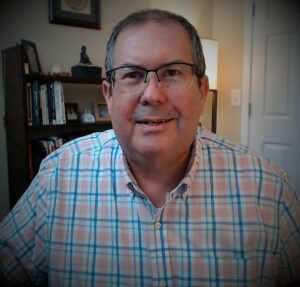
L. Gordon Brewer Jr., LMFT |Podcast Host – Gordon has spent his career in helping professions as a licensed therapist, counselor, trainer, and clergy person. He has worked with 100’s of people in teaching them the how to better manage their emotions through self-care and the practices of kindness and compassion. Follow us on Instagram and Facebook . And be sure to subscribe to our newsletter.

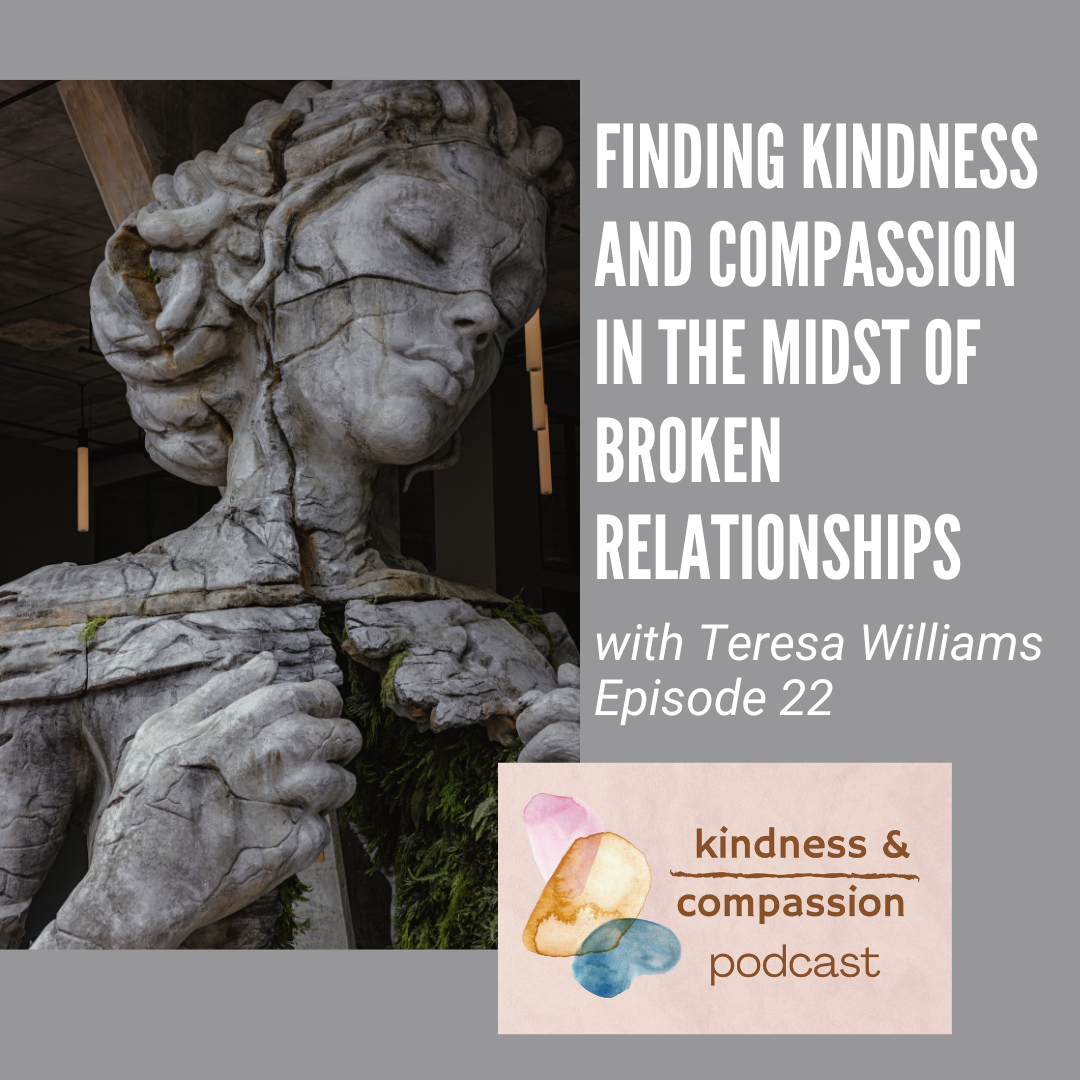
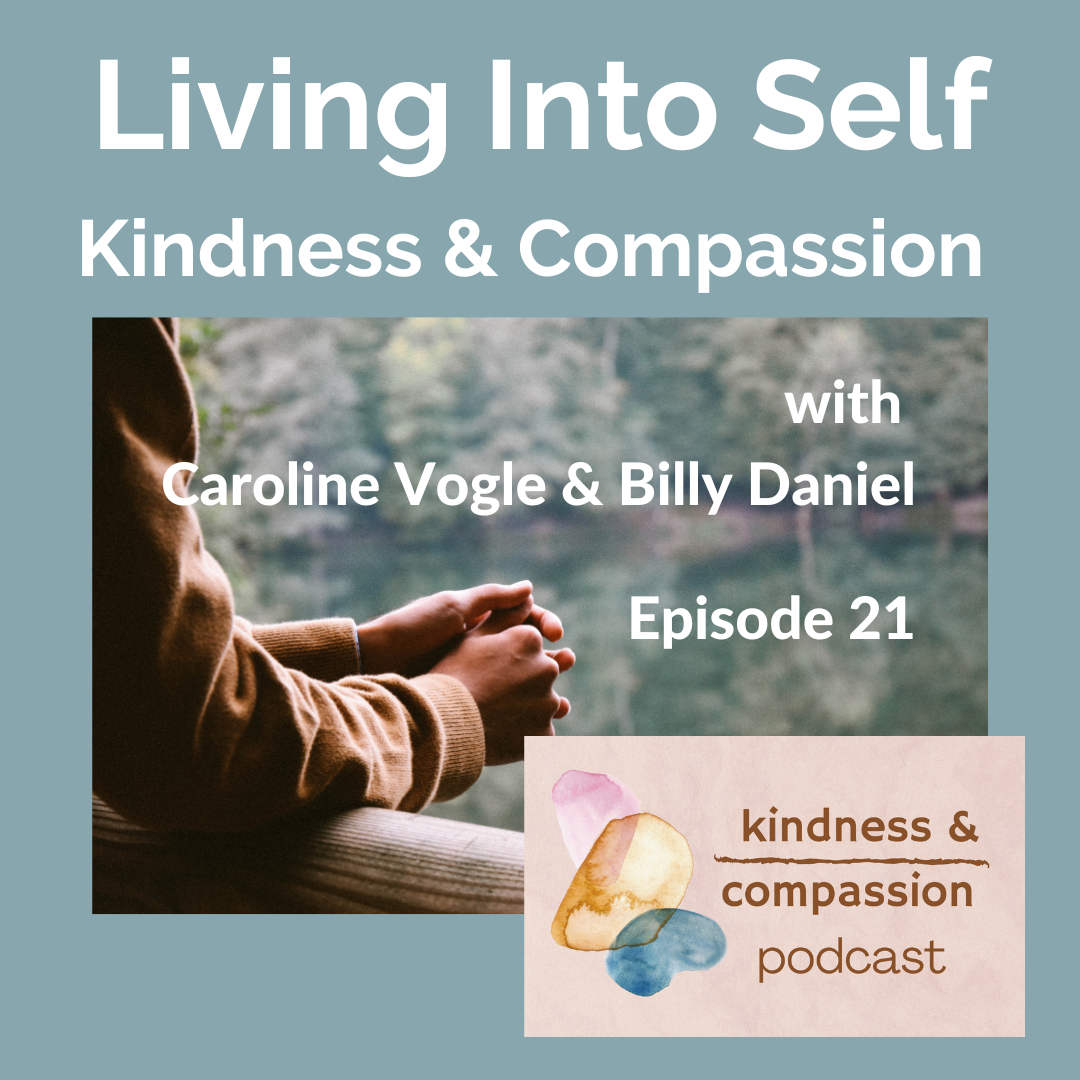
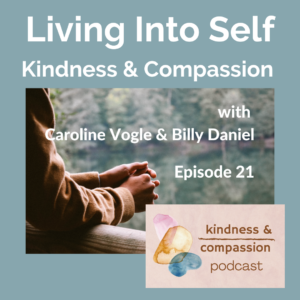 In this episode, Gordon has a conversation with The Rev. Caroline Vogel and The Rev. Dr. Billy Daniel about how we can practice kindness and compassion by reaching out to those around us, offering a helping hand, and showing understanding and empathy. They also talk about ways to build bridges between different communities, cultures, and beliefs by listening to each other and trying to understand one another’s perspectives. One of the most important practices to foster kindness and compassion is self-compassion. Self-compassion is the practice of being kind to oneself and recognizing that we all make mistakes and have flaws. It is important to recognize that we all have our own unique set of experiences and that we can learn from our mistakes.
In this episode, Gordon has a conversation with The Rev. Caroline Vogel and The Rev. Dr. Billy Daniel about how we can practice kindness and compassion by reaching out to those around us, offering a helping hand, and showing understanding and empathy. They also talk about ways to build bridges between different communities, cultures, and beliefs by listening to each other and trying to understand one another’s perspectives. One of the most important practices to foster kindness and compassion is self-compassion. Self-compassion is the practice of being kind to oneself and recognizing that we all make mistakes and have flaws. It is important to recognize that we all have our own unique set of experiences and that we can learn from our mistakes.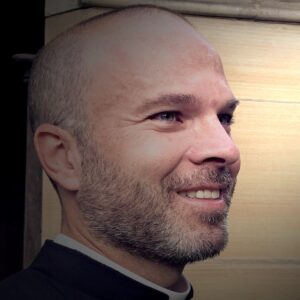 The Rev. Dr. Billy Daniel is a priest, poet, theologian and the rector at Church of the Ascension and author of
The Rev. Dr. Billy Daniel is a priest, poet, theologian and the rector at Church of the Ascension and author of 

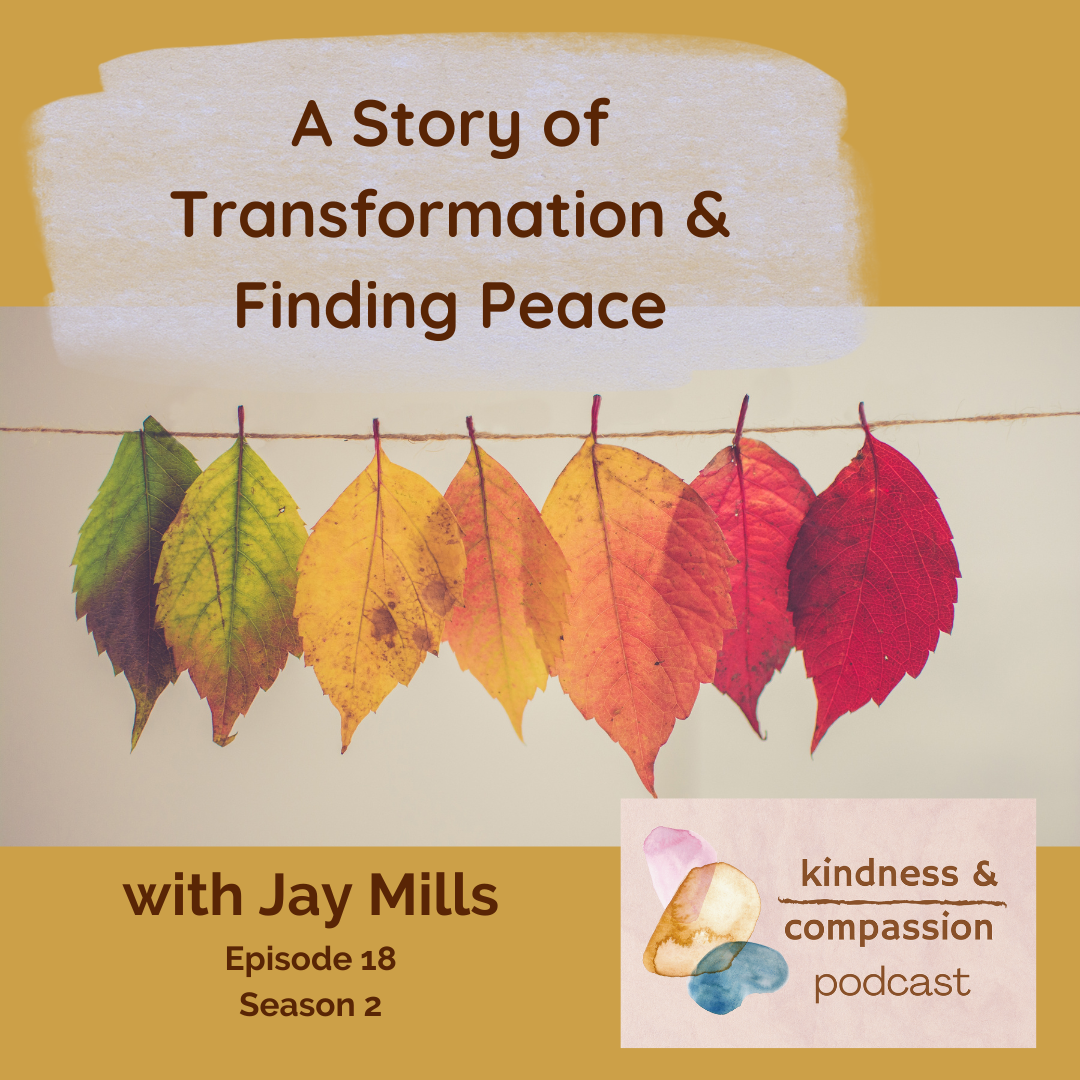
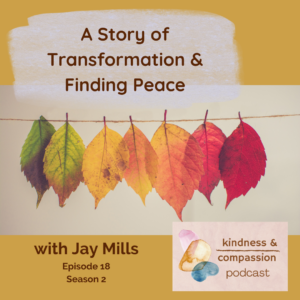
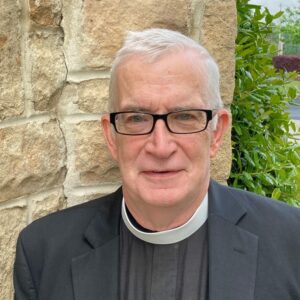 The Rev. Jay Mills was raised in a middle-class home with parents that were reasonably good parents. And I ended up getting sexually assaulted when I was 12 years old, and my life very quickly unraveled. Jay started doing drugs and alcohol heavily. He ended up being addicted very young. He was also a really angry kid with a lot of violence. He lived that way until he was about 21, where he went through a conversion through the ministries of Campus Crusade for Christ. While he does not agree with their theology now, he says “I owe them my life cause as I’ve often said, if I waited for the Episcopal Church to evangelize me, I’ve died in a drug house.
The Rev. Jay Mills was raised in a middle-class home with parents that were reasonably good parents. And I ended up getting sexually assaulted when I was 12 years old, and my life very quickly unraveled. Jay started doing drugs and alcohol heavily. He ended up being addicted very young. He was also a really angry kid with a lot of violence. He lived that way until he was about 21, where he went through a conversion through the ministries of Campus Crusade for Christ. While he does not agree with their theology now, he says “I owe them my life cause as I’ve often said, if I waited for the Episcopal Church to evangelize me, I’ve died in a drug house.
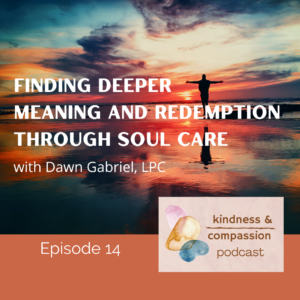 In this episode
In this episode 
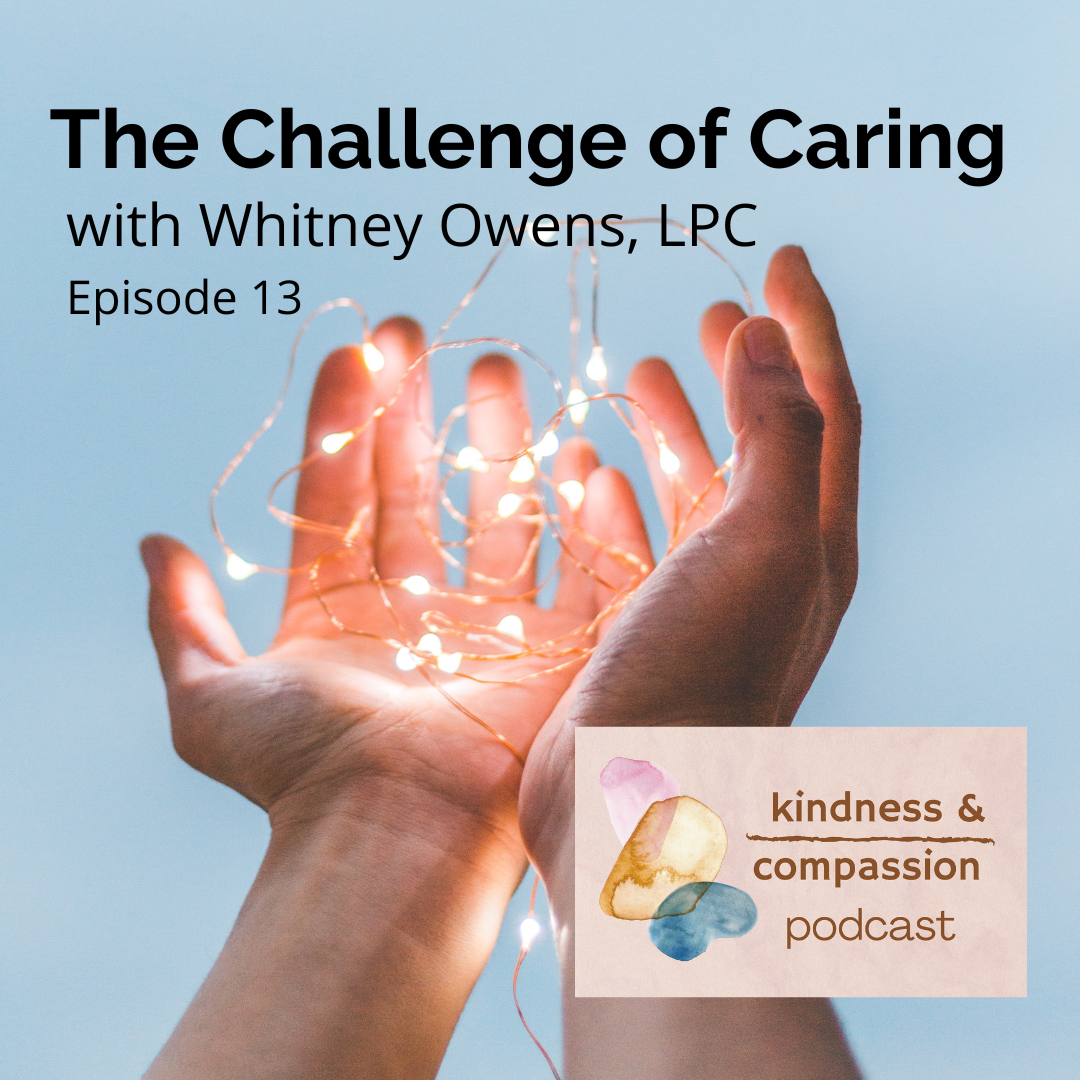
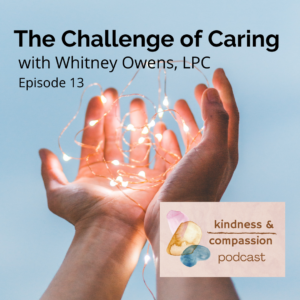 In this episode, Gordon has a conversation with Whitney Owens about being a caregiver and living into kindness and compassion through those challenges. Whitney opens the show by talking about the book,
In this episode, Gordon has a conversation with Whitney Owens about being a caregiver and living into kindness and compassion through those challenges. Whitney opens the show by talking about the book, 